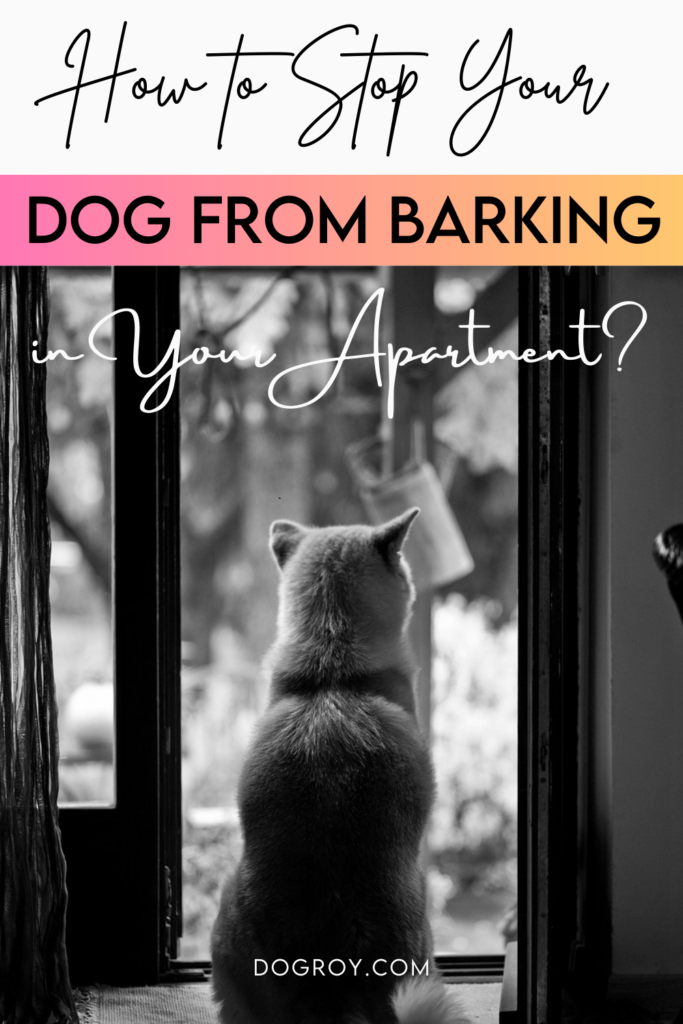If you’ve found yourself wondering, How can I stop my dog from barking in my apartment? – you’re in the right place.
Living in close quarters has its challenges,
Barking can disrupt the peace and harmony of apartment living.
but fear not!
In this guide, we’ll share 12 smooth and friendly tips to help you address your dog’s barking behavior, creating a serene atmosphere for both you and your four-legged companion.
Table of Contents
Tips on How to Stop Your Dog From Barking in Your Apartment?

1] Understand the Bark
Before curbing barking, it’s crucial to delve into the reasons behind your dog’s vocalizations.
Dogs bark for various reasons, including boredom, excitement, anxiety, or as a response to external stimuli.
Observing the context and triggers surrounding the barking helps in decoding its purpose.
Is your dog alerting you to something, expressing excitement, or signaling distress?
Understanding the motivation behind the bark is the first step in effectively addressing and modifying this behavior.
2] Positive Reinforcement
Encouraging quiet behavior in your dog involves the strategic use of positive reinforcement.
When your dog refrains from barking upon a cue or command, promptly reward them with treats, praise, or affection.
This positive reinforcement establishes a connection between silence and positive experiences, reinforcing the desired behavior.
Over time, your dog learns that quiet moments lead to enjoyable rewards, motivating them to bark less frequently.
Tip: “Reward your dog with treats, praise, or affection when they refrain from barking on cue.”
3] Communication Commands
Teaching your dog specific verbal commands like “quiet” or “enough” empowers you to communicate effectively.
Consistency is key in using these commands whenever your dog starts barking.
Through patient repetition and positive reinforcement, your dog begins to associate the verbal cue with ceasing to bark.
Reinforce compliance with treats or affection to strengthen the effectiveness of these communication commands in curbing excessive barking.
4] Interactive Toys
Boredom is a common trigger for excessive barking.
Combat this by providing your dog with a variety of engaging toys.
Puzzle toys, treat dispensers, or chew toys can keep your dog mentally stimulated and physically occupied.
By offering activities that capture their attention, you redirect their focus, effectively minimizing the urge to bark out of boredom.
• Identify boredom as a trigger for excessive barking. • Provide engaging toys like puzzle toys or treat dispensers. • Keep your dog mentally stimulated and physically occupied. • Redirect their focus with activities to minimize boredom-induced barking.
5] Create a Quiet Zone
Designate a specific area in your apartment as a quiet zone where your dog can retreat and relax.
Set up a cozy bed with familiar items, creating a comforting environment.
This designated space serves as a retreat for your dog when they need a break, reducing stress-induced or excitement-triggered barking.
Ensuring a peaceful haven within your apartment contributes to overall behavioral balance.
6] Regular Exercise
Adequate exercise is a fundamental component of managing barking behavior.
Regular walks, playtime, and mentally stimulating activities contribute to burning off excess energy.
A tired and content dog is less likely to engage in unnecessary barking, making daily exercise an essential part of your strategy to diminish barking in your apartment.
Tip: “Regular walks, playtime, and mental stimulation activities contribute to a tired and content pup, diminishing unnecessary barking.”
7] Desensitize to Triggers
If specific triggers consistently prompt barking, employ a desensitization strategy.
Gradually expose your dog to these stimuli in a controlled and positive manner.
This process helps your dog become more accustomed to the triggers, diminishing the reactive response.
By gradually introducing and acclimating your dog to potential barking triggers, you can foster a calmer and more composed behavior.
8] Calming Supplements
Explore natural calming supplements or pheromone diffusers to address anxiety-related barking.
Natural aids such as chamomile or lavender can have a soothing effect on your dog’s state of mind.
Consult with your veterinarian to determine the suitability of these supplements for your dog’s specific needs.
Calming supplements contribute to creating a more relaxed atmosphere, reducing stress-related barking episodes.
Tip: “These aids contribute to a more relaxed state of mind, reducing stress-related barking in your apartment.”
9] Background Noise
External sounds from the urban environment can be significant triggers for barking.
Use background noise, such as soft music or white noise machines, to mask these external sounds.
Creating a more serene auditory environment within your apartment can help your dog remain calm, reducing the likelihood of barking triggered by external stimuli.
10] Training Classes
Consider enrolling in training classes with a certified professional to address persistent barking challenges.
Professional trainers can offer personalized guidance, tailored exercises, and insights into effective communication strategies.
Training classes foster a stronger bond between you and your dog while providing valuable tools to manage and modify barking behavior.
Tip: “Certified trainers can address specific barking challenges, enhancing communication between you and your dog.”
11] Consult Your Vet
If barking persists despite your efforts, consult your veterinarian to rule out any underlying health issues contributing to the behavior.
Physical discomfort or pain can sometimes manifest as excessive barking.
A thorough veterinary examination ensures that potential health concerns are identified and addressed, contributing to a holistic approach in managing your dog’s behavior.
12] Neighbor Interaction
Maintaining open communication with your neighbors is essential when addressing your dog’s barking behavior in an apartment setting.
Proactively inform your neighbors that you are actively working on curbing excessive barking and encourage them to communicate any disturbances.
Building understanding fosters a harmonious apartment community and allows for collaborative efforts in creating a peaceful living environment for everyone.
Regular updates on your progress can further demonstrate your commitment to addressing the issue and maintaining a positive relationship with your neighbors.
Tip: “Encourage them to inform you of disturbances, fostering understanding for a harmonious apartment community.”
How to Stop Your Dog From Barking in Your Apartment – FAQs
Is it normal for dogs to bark in an apartment?
While some barking is normal, excessive or disruptive barking may indicate underlying issues. Addressing the cause and implementing training can help manage and minimize barking.
Can breeds influence barking behavior?
Yes, certain breeds are more vocal than others. However, individual temperament and training play significant roles in a dog’s barking behavior. Consistent training can modify excessive barking regardless of breed.
How long does it take to stop barking with training?
Training timelines vary, but consistent efforts can show positive results within a few weeks. Patience, consistency, and positive reinforcement are key to successful barking behavior modification.
Are anti-bark collars effective?
Anti-bark collars can be effective, but they should be used with caution and under professional guidance. Positive reinforcement-based training is generally recommended to address barking behavior.

So there you have it!
By applying the 12 practical tips outlined in this guide on How to Stop Your Dog From Barking in Your Apartment, you’re on your way to a quieter and more enjoyable environment.
Remember, consistency is key, and a patient, positive approach will go a long way in transforming your apartment into a haven of peace for both you and your canine friend.
Here’s to a bark-free and blissful coexistence in your apartment living!





